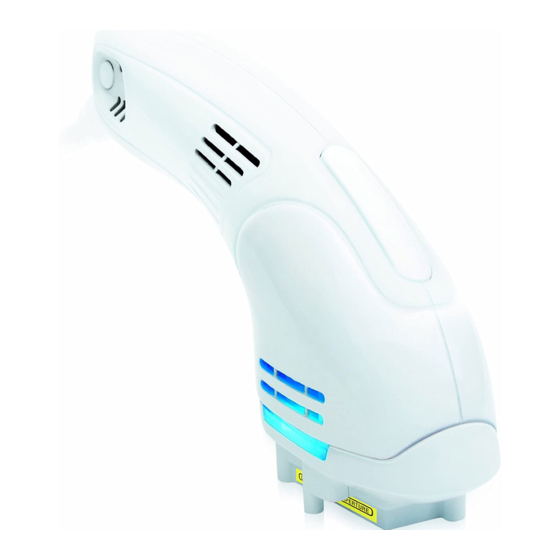
Summarization of Contents
General Safety Warnings
Appliance Usage and Eye Safety
Guidelines for safe use by children and avoiding eye exposure.
Environmental and Skin Suitability Warnings
Usage Restrictions and Unsuitable Skin Tones
Warnings about flammable materials, wet environments, and dark skin tones.
Hair Colour and Treatment Area Warnings
Unsuitable Hair Colours and Areas Not to Treat
IPL is not for red/blonde/grey/white hair. Avoid specific skin conditions and areas.
Health Condition and Medication Warnings
Contraindications: Pregnancy, Epilepsy, Photosensitivity
Do not use if pregnant, have epilepsy, or are taking photosensitizing medication.
Medical History and Reaction Warnings
Medical History and Common Skin Reactions
Avoid if history of skin cancer, diabetes, etc. Mentions heating sensation and slight reddening.
Treatment Discontinuation Warnings
Discontinuing Treatment and Seeking Medical Advice
Effects requiring treatment cessation like pain, itching, redness, blistering, or burning.
Introduction to IPL Hair Removal Technology
IPL Hair Remover Functionality Overview
Overview of Intense Pulsed Light technology for hair removal on various body areas.
Main Unit Components and Controls
Keyswitch, Buttons, Indicators, and Power Socket
Identification of keyswitch, buttons, indicators, and power socket on the main unit.
Wand and Accessory Components
Wand Parts, Sensors, and Included Accessories
Details of IPL treatment button, lights, aperture, sensors, razor, and keys.
Suitable Skin Types for IPL Treatment
Skin Tone Suitability and Hair Contrast Requirements
IPL suitability for fair to tanned skin; hair must be darker than skin for effectiveness.
Treatment Summary and Protocol Flowchart
Step-by-Step Treatment Process Guide
Flowchart outlining the process from warnings to treatment and reaction checks.
Patch Test Procedure for Skin Safety
Skin Sensitivity Testing for Power Level Determination
Instructions for patch testing to determine maximum safe power level for skin type.
Skin Chart and Maximum Power Levels
Skin Type Classification and Power Settings Table
Table correlating skin type (I-VI) with tanning history and maximum power levels.
Pre-Treatment Preparation and Guidance
Preparation Steps and Power Adjustment Advice
Pre-treatment checks, hair removal methods, and guidance on increasing power levels.
Instructions for Use: Initial Steps
Shaving, Power Connection, and Unit Activation
Steps for preparing the area, connecting power, and turning the unit on.
Instructions for Use: Security and Readiness
Security Code Entry and System Self-Checks
Procedure for entering the security code and system self-checks before treatment.
Instructions for Use: Treatment Application
Wand Placement and Ensuring Skin Contact
How to press the enable button, place the wand, and ensure skin sensor contact.
Instructions for Use: Treatment Completion
Performing Treatment Flashes and Post-Flash Checks
Steps for initiating treatment flashes, self-checks, and moving to the next area.
Error Codes and Troubleshooting Guide
Indicator Lights for Common Device Errors
Explanation of error codes related to overheating, fan errors, and energy saving mode.
Operational Features: Mute and Storage
Mute Option and Wand Cable Storage Method
How to mute audio indications and store the wand cable properly.
Facial Treatment Guidelines
Safe Treatment Areas on the Face
Guidance on where the IPL hair remover can be safely used on the face.
Treatment Area Marking Techniques
Using Indentation Marks for Grid Coverage
Method for marking treatment areas using indentation and eyeliner for grid patterns.
Treatment Cartridge: Indicators and Replacement
Bulb Life Indicators and Replacement Timing
Understanding yellow and red flashing lights indicating remaining bulb life and replacement.
Treatment Cartridge: Changing Procedure
Steps for Cartridge Removal and Installation
Detailed steps for turning off the unit, removing the old cartridge, and installing a new one.
Understanding Hair Growth Cycles
Explanation of Hair Growth Phases
Explanation of Anagen, Catagen, and Telogen phases and their relevance to IPL treatment.
Determining Required Treatments
Factors Influencing Treatment Frequency
Discussion on hair growth cycle, age, metabolism, and factors influencing treatment needs.
Treatment Schedule by Body Site
Body Site Specific Treatment Frequencies
Table detailing follicle density, resting phase, and active growth times for different body sites.
Questions and Answers: Preparation and Areas
Skin Prep, Hair Prep, and Treatable Areas
Answers on skin preparation, hair preparation, and areas suitable for IPL treatment.
Questions and Answers: Skin Sensitivity and Aftercare
Sensitive Skin Use and Post-Treatment Avoidance
Information on using IPL on sensitive skin and what to avoid after treatment.
Questions and Answers: Treatment Frequency
Repeat Treatment Intervals and Aftercare Routines
Guidance on how often to repeat treatments and recommended aftercare practices.
Questions and Answers: Methods and Technology
Alternative Methods and IPL vs. Laser Differences
Advice on other hair removal methods between treatments and IPL vs. laser differences.
Questions and Answers: Safety and Side Effects
Device Safety Features and Potential Side Effects
Explanation of safety features like keylock, sensors, and potential skin side effects.
Important Usage Precautions
General Safety and Handling Guidelines
Key precautions including key storage, discomfort assessment, ventilation, and avoiding interference.
Maintenance and Disposal Instructions
Cleaning, Repair, and Environmental Disposal
Instructions for cleaning, warnings against disassembly, and WEEE disposal guidelines.
Customer Care and Technical Specifications
Contact, Warranty, and Operating Details
Information on customer support, website, product specifications, and operating environment.








Need help?
Do you have a question about the IPL and is the answer not in the manual?
Questions and answers